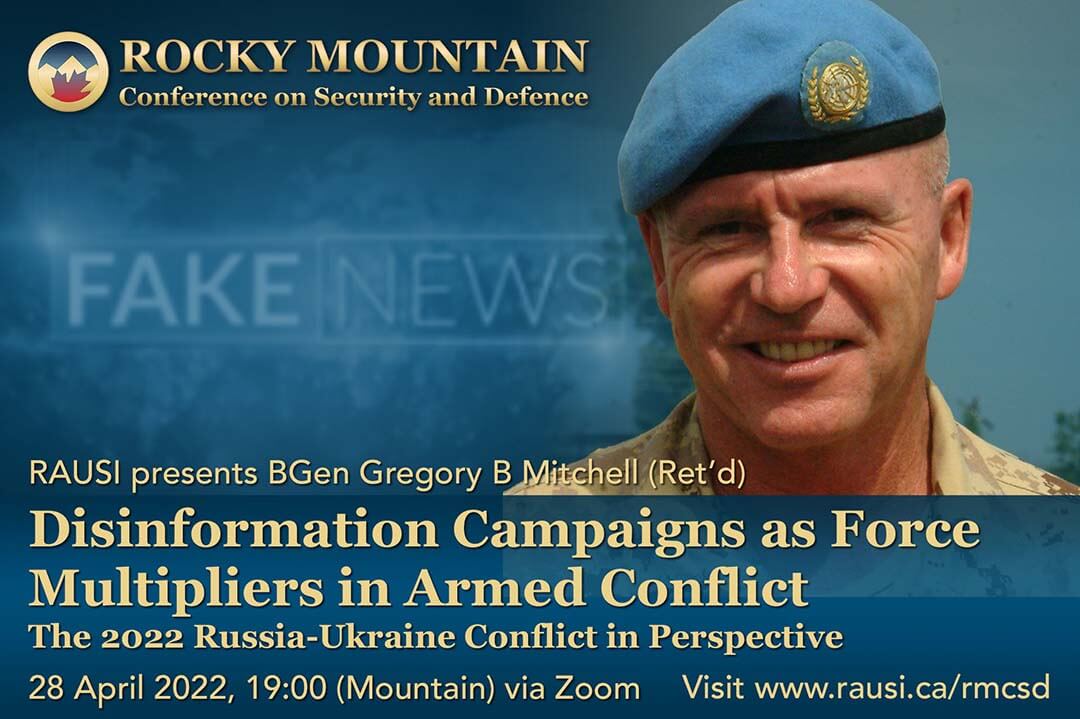28 April, 2022

Continuing the style of penetrating analysis that RAUSI enjoyed February 2022 in Dr Sean M Maloney’s analysis of nuclear weapons in the Russia-Ukraine conflict, BGen Gregory B Mitchell (Ret'd) diagnoses misinformation campaigns and Russia’s employment of them in its current dispute with Ukraine.
Western democracies are weathering crises that erode national and global security. Growing dependency on information technology increases vulnerability to service disruption through malware and to a growing and equally sinister threat – disinformation campaigns, i.e., false information deliberately and covertly spread to influence public opinion or obscure the truth. Disinformation intends to influence the target audience to cede defeat by convincing it of the futility of fighting.
In using disinformation on a target population, the conflict becomes one in which there are no ‘non-combatants’ as found in conventional warfare – everyone is a legitimate target. Disinformation manipulates the target to become an accomplice. The target serves the adversary’s interests unwittingly by becoming polarized vice unified, and confused vice accurately informed, thereby undermining the public’s confidence in its leadership. “If deterrence kept peace during the Cold War and Nuclear Age, resilience may be the governing principle of the Digital Age.” Counter campaigns in education and awareness may drive proactive measures in "dis-disinformation" and in cooperative cyber defence. Avoiding fake experts, logical fallacies, impossible expectations, cherry picking, and conspiracy theories is a useful first step.
Following a 20-minute presentation, the audience will be encouraged to challenge and discuss with relevant questions. These will be non-partisan discussions aimed at generating thought-provoking responses allowing all parties to become better informed on security and defence.
Videos
RMCSD No Video
At the request of the presenter, this recording is not publicly available. Become a member (or login) to receive access!
Once you have logged in as a member, return to this page and the video will be displayed.
Watch Joe Howard's Teaser Episode 1 (1:40), introducing the presentation.
About the Presenter
Brigadier-General Gregory B. Mitchell (Ret'd), CD, MPA, has significant international peacekeeping experience, including his final posting to Denmark where he commanded the Multinational Stand-by High Readiness Brigade for United Nations Operations (SHIRBRIG), an organization he led on deployment to the Sudan. Upon retirement from the Army, Greg worked on behalf of the UN’s Department of Peacekeeping Operations, was Director of Roméo Dallaire’s Child Soldiers Initiative, Director of Exercises and Simulations at the Pearson Peacekeeping Centre (working primarily with the African Union), and most recently was Executive Director of the Royal Military Colleges Club of Canada. He currently works as Executive Director of Peace Operations Consulting in Kingston, ON, volunteers with the Canadian Peacekeeping Veterans’ Association as its Special Advisor on Peacekeeping, and will soon complete his second graduate degree, this time in Public Safety.
